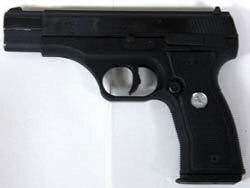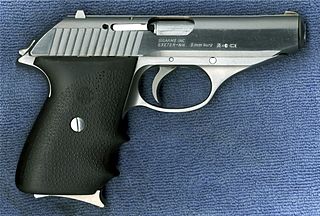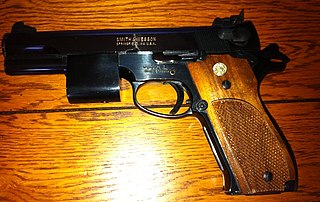
The SIG Sauer P220 is a semi-automatic pistol. Designed in 1975 by the SIG Arms AG division of Schweizerische Industrie Gesellschaft, and produced by J. P. Sauer & Sohn, in Eckernförde; it is currently manufactured by both SIG Sauer companies: SIG Sauer GMBH, of Eckernförde, Germany; and SIG Sauer, Inc., of New Hampshire, United States.

The SIG Pro is a series of semi-automatic pistols developed by SIG Sauer in Exeter, New Hampshire. It became the first polymer-frame handgun from SIG Sauer and one of the first pistols to feature a built-in universal accessory rail and interchangeable grips. Offerings in the series are chambered in .40 S&W, .357 SIG, or 9×19mm Parabellum. As of March 2020, only the SP 2022 variant is still listed on the SIG Sauer website. The SIG Pro was marketed as a lightweight and compact alternative to the "legacy" SIG Sauer handguns in an increasingly competitive and budget-oriented law enforcement market.

L. W. Seecamp Co. was an American manufacturer of pocket pistols located in Milford, Connecticut from 1981 to 2014. In 2014, Whalley Precision purchased the company and took over production of the pistols from their facility in Southwick, Massachusetts.

The Smith & Wesson Model 10, previously known as the Smith & Wesson .38 Hand Ejector Model of 1899, the Smith & Wesson Military & Police or the Smith & Wesson Victory Model, is a K-frame revolver of worldwide popularity. In production since 1899, the Model 10 is a six-shot, .38 Special, double-action revolver with fixed sights. Over its long production run it has been available with barrel lengths of 2 in (51 mm), 3 in (76 mm), 4 in (100 mm), 5 in (130 mm), and 6 in (150 mm). Barrels of 2.5 inches (64 mm) are also known to have been made for special contracts. Some 6,000,000 of the type have been produced over the years, making it the most produced handgun of the 20th century.

In American English, a pocket pistol is any small, pocket-sized semi-automatic pistol, and is suitable for concealed carry in a pocket or similar space.

The Colt Delta Elite is a modified M1911 pistol, Series 80 configuration, chambered for the 10mm Auto. It is similar to the M1911 in design and operation. Colt manufactured both stainless steel and blued versions with eight-round magazines. A Delta Gold Cup model was also offered for target competition. The stainless steel Government Model version has recently been reintroduced.

The Colt Model 1903 Pocket Hammerless is a .32 ACP caliber, self-loading, semi-automatic pistol designed by John Browning and built by Colt Patent Firearms Manufacturing Company of Hartford, Connecticut. The Colt Model 1908 Pocket Hammerless is a variant introduced five years later in .380 ACP caliber. Despite the title "hammerless", the Model 1903 does have a hammer. The hammer is covered and hidden from view under the rear of the slide, this allows the pistol to be carried in and withdrawn from a pocket quickly and smoothly without snagging.
The Kimber Eclipse is a model 1911 semi-automatic pistol chambered for the .45 ACP and 10mm Auto cartridges. It is made by Kimber Manufacturing in Yonkers, New York. There are several models of Kimber Eclipse, of different sizes and with different combinations of features.

The Colt Commander is a single-action, semi-automatic, magazine-fed, and recoil-operated handgun based on the John M. Browning–designed M1911. It was the first mass-produced American pistol with an aluminium alloy frame and the first Colt pistol to be chambered in 9mm Parabellum.

The Colt Detective Special is a six-shot, carbon steel framed, 2-inch (5.1 cm) or 3-inch (7.6 cm) barreled, double-action revolver, and the first example of a class of firearms known as "snubnose revolvers". Made by Colt's Manufacturing Company, this model revolver, as the name "Detective Special" suggests, was intended to be a concealed weapon used by plainclothes police detectives.

Kahr Arms is an American small arms manufacturer focused on compact and mid-size semi-automatic pistols chambered for popular cartridges, including .380 ACP, 9mm Luger, .40 S&W and .45 ACP. Kahr pistols feature polymer or stainless steel frames, single-stack magazines, and double-action-only striker firing actions. Kahr Arms is part of the Kahr Firearms Group, a US-based firearms manufacturer, which also includes Thompson Auto-Ordnance and Magnum Research. The Kahr Firearms Group company headquarters is in Greeley, Pennsylvania, with a manufacturing facility in Worcester, Massachusetts.

The Smith & Wesson Model 13 is a .357 Magnum revolver designed for military and police use. It is based on Smith & Wesson's K-frame—specifically, it is a .357 Magnum version of the heavy-barrel variant of the .38 Special Model 10.

The Smith & Wesson Model 64Military and Police revolver is the stainless steel version of the Model 10.

The Colt 2000 or All American 2000 is a polymer or aluminum-alloy framed, locked-breech, rotating barrel, semiautomatic, 9 mm handgun with a magazine capacity of 15 rounds manufactured by Colt.

The SIG Sauer P230 is a small, semi-automatic handgun chambered in .32 ACP or .380 Auto. It was designed by SIG Sauer of Eckernförde, Germany. It was imported into the United States by SIGARMS in 1985. In 1996 it was replaced by the model P232.
The Smith & Wesson 645 and Smith & Wesson 745 are second-generation semi-automatic pistols which predate Smith & Wesson's 4500 series of handguns. The S&W 645/745 is chambered for the .45 ACP cartridge. The S&W 645 is constructed almost entirely from stainless steel and is thus extremely resistant to harsh weather conditions, whereas the S&W 745 has a stainless steel frame and a blued carbon steel slide. The S&W 645 was introduced in 1985 and discontinued in 1988. The S&W 745 was produced from 1986 to 1990, primarily as a single-action competition gun for IPSC shooting.

The Colt Officer's Model or Colt Officer's ACP is a single-action, semi-automatic, magazine-fed, and recoil-operated handgun based on the John M. Browning designed M1911. It was introduced in 1985 as a response from Colt to numerous aftermarket companies making smaller versions of the M1911 pistol.

The Smith & Wesson Model 52, sometimes referred to as the 38 Master, is a semi-automatic pistol developed by Smith & Wesson for Bullseye shooting. It was one of the first semiautomatic pistols chambered in .38 Special with flush-seated, full wadcutter bullets. The shape of the rimmed cartridge limited the magazine capacity to five rounds. A variant, known as the Model 952, in 9 mm Parabellum, is still produced in limited quantities by Smith & Wesson's Performance Center. The Model 52 was discontinued in 1993 when the machinery to manufacture the pistol broke down and it was deemed too costly to replace.

The SIG MPX is a gas-operated submachine gun designed and manufactured by SIG Sauer, and is primarily chambered in 9×19mm Parabellum. It is a gas-operated firearm featuring a closed, rotating bolt. These design features, rare in submachine guns, were chosen to enhance the safety of the user and to have a more reliable firearm. It was designed in 2013 and was released to the general public in 2015. It features the SIG Sauer short stroke push-rod gas system to reduce the recoil and improve the reliability of the weapon.

The SIG Sauer P227 is an American-designed and produced semi-automatic pistol which was introduced in 2013 and discontinued in 2019. The P227 introduced a double-stack .45 ACP caliber handgun into the SIG Sauer lineup. It was introduced along with the P224.






















